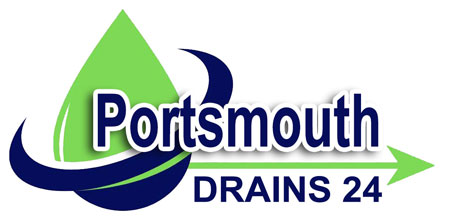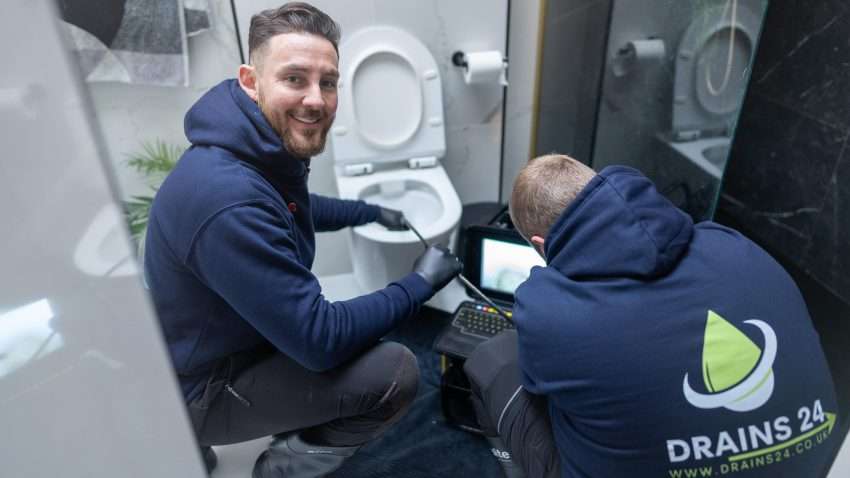Bathroom drains in Portsmouth work hard every day. Showers, baths, basins and toilets all feed into the same network, meaning issues build up quickly if not maintained. From hard water limescale to hair buildup and soap residue, bathroom drain blockages are one of the most common callouts for Portsmouth Drains24.
This guide explains the most effective ways to prevent bathroom drain blockages, reduce slow drainage, and keep your plumbing flowing all year.
Why bathroom drains block so easily
Portsmouth’s coastal environment and hard water areas contribute to drainage problems. Common causes include:
- Hair buildup in shower and bath traps
- Soap scum creating thick residue
- Hard water limescale narrowing the pipe diameter
- Foreign objects flushed accidentally
- Wipes, cotton pads, and sanitary products
- Shampoo and conditioner residue
- Mineral deposits from hard water
These issues compound quickly in older properties across Fratton, Southsea, North End, and Milton.
Daily habits that prevent bathroom blockages
Install and clean hair catchers
Hair is the number one cause of bathroom blockages. A simple hair catcher prevents most issues. Clean it every couple of days for best performance.
Flush drains with hot water
Pour hot (not boiling) water down showers and basins once a week. This melts soap residue and helps prevent early limescale.
Use less product
Excessive shampoo, conditioner, body wash or shaving cream leaves residue inside the pipes. Using slightly less reduces buildup significantly.
Wipe down sinks regularly
Toothpaste, makeup residue and shaving debris can harden inside pipes. Wiping sinks before rinsing helps reduce pipe buildup.
What NOT to put down bathroom drains
Many blockages come from products that should never enter the drainage system.
Avoid disposing of:
- Wet wipes (even “flushable” ones)
- Cotton buds and cotton pads
- Face wipes and makeup wipes
- Dental floss
- Hair clippings
- Sanitary products
- Thick toothpaste residue
These items swell, tangle, and can block narrow pipe sections rapidly.
Hard water and limescale — a Portsmouth-specific problem
Portsmouth is a high limescale area. Over time, hard water forms deposits inside the pipes, causing:
- Narrowed pipe diameters
- Rough surfaces that catch debris
- Increased soap scum buildup
- Reduced drainage speed
Routine limescale cleaning and occasional professional jetting help prevent this.
Deep cleaning bathroom drains safely
Use a natural cleaning mix
A safer alternative to corrosive chemicals:
Mix bicarbonate of soda and white vinegar, pour it into the drain, and flush with hot water after 15 minutes.
This helps break down light organic buildup.
Avoid harsh chemical cleaners
Many drain cleaners damage older clay and plastic pipes. They also create toxic fumes and can worsen blockages by turning grease into a solid mass.
Clean removable traps
Basin traps can be unscrewed and cleaned manually. This is one of the most effective ways to remove toothpaste buildup and hair.
When to call Portsmouth Drains24
Professional intervention is recommended if you notice:
- Slow drainage that returns frequently
- Bad smells coming from shower or sink drains
- Gurgling noises in pipes
- Water backing up through the shower tray
- Black sludge appearing around plugholes
Our engineers use CCTV drain surveys, high-pressure jetting, and non-destructive investigation to identify and fix deeper problems.
Benefits of professional bathroom drain maintenance
- ✔ Prevents recurring blockages
- ✔ Keeps water flowing efficiently
- ✔ Removes scale and soap buildup
- ✔ Identifies cracks or collapsed sections
- ✔ Protects older plumbing systems
- ✔ Reduces long-term repair costs
Bathroom drain blockages can be prevented with simple daily habits and occasional professional maintenance.
📞 Call Drains24 for bathroom drain cleaning and blockage prevention in Portsmouth — available 24/7 across the city.
Bathroom Drain Bloackage FAQs
What causes bathroom drains to block?
Bathroom drains in Portsmouth commonly block due to hair, soap residue, limescale, wipes, and small foreign objects entering the pipework. Over time these materials build up, restricting water flow and causing slow drainage or backups. Hard water in the area also accelerates scale formation, making regular bathroom drain maintenance essential.
How can I prevent shower drain blockages?
Using a hair catcher is one of the simplest and most effective ways to prevent shower blockages. You should also limit the amount of product going down the drain, flush the pipe with hot water weekly, and avoid rinsing thick residues like shaving foam or heavy conditioner directly into the outlet, as these cling to the pipe walls.
Is hard water a problem for bathroom drains?
Yes. Portsmouth has naturally hard water, which leads to limescale forming inside bathroom pipes. This scale narrows the internal diameter of the pipes, slowing drainage and encouraging further debris to collect. Without proper maintenance, this buildup can cause recurring blockages in showers, baths, basins, and toilets.
When should I call a professional?
You should contact Portsmouth Drains24 if your bathroom drains repeatedly empty slowly, begin to smell, gurgle, or back up. Persistent issues indicate a deeper blockage or structural problem that DIY methods won’t fix. Professional engineers can diagnose the issue quickly and clear the pipe safely using specialist equipment.
Do chemical drain cleaners work?
Chemical cleaners may provide short-term relief, but they can damage older pipes found in many Portsmouth homes. They often harden grease rather than dissolve it, creating tougher blockages later. Professional jetting and CCTV surveys offer a safer, long-lasting solution for bathroom drain problems.

